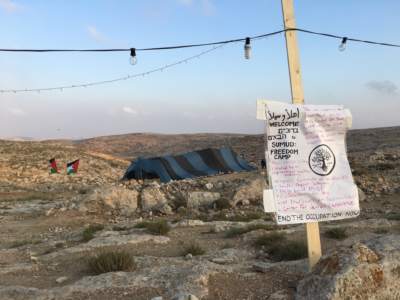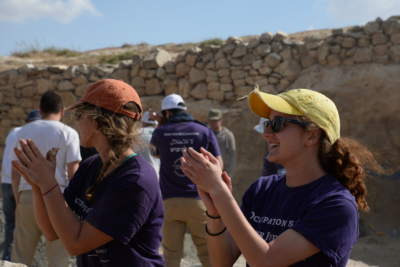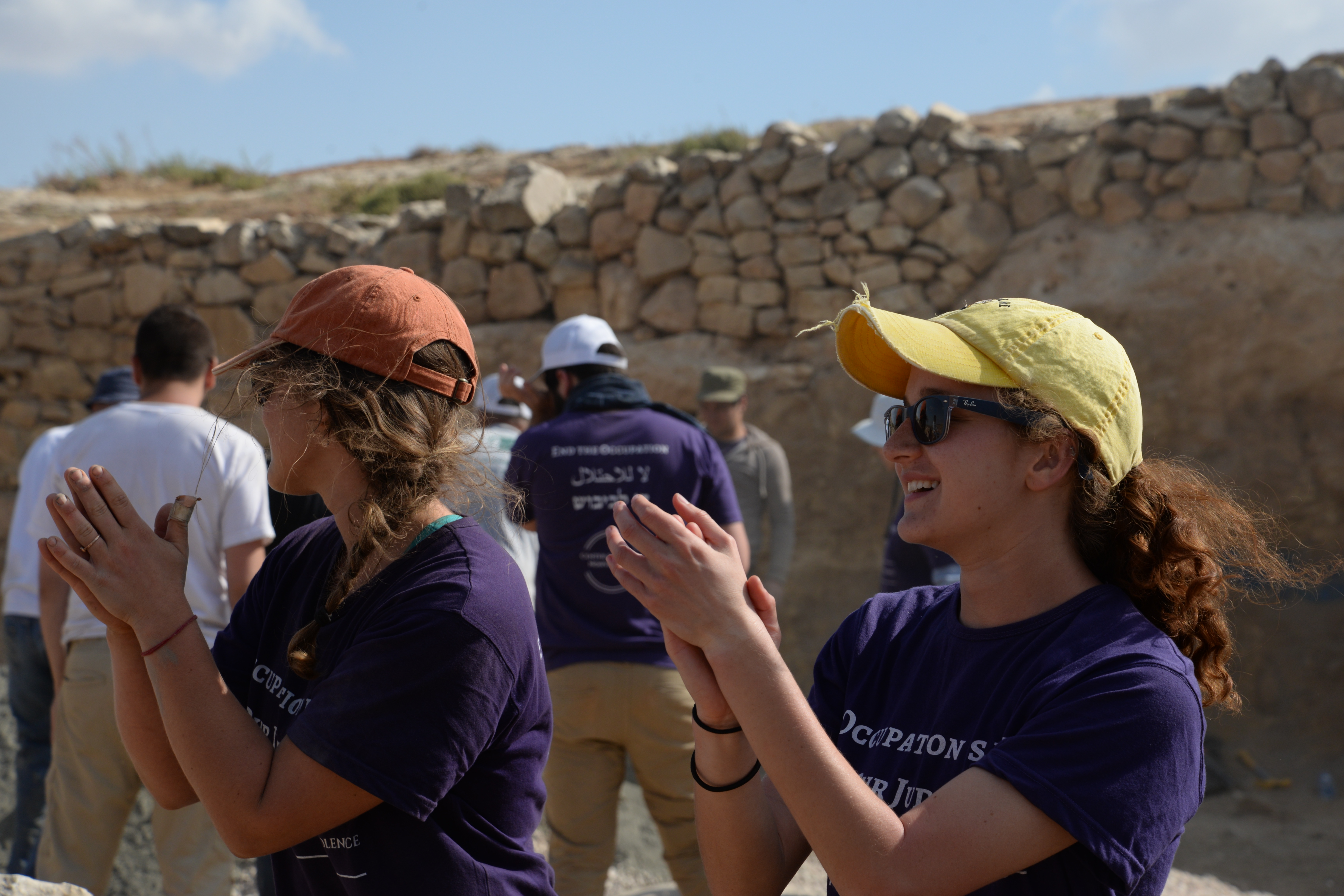In Sarura, a village in the West Bank, a group of Jewish and Palestinian activists worked together to raise the first tent in the Sumud Freedom Camp on May 19. The group, which included a number of Jewish students, constructed the camp in the same location where Palestinians were evicted in the 1990s. They did so in part to call attention to the 50th anniversary of the Six-Day War, the beginning of Israel’s occupation of the West Bank.

Among the participating organizations was the Center for Jewish Nonviolence (CJNV), a group that brings diaspora Jews to Israel to engage in nonviolent actions in partnership with Palestinian organizations. According to professor Ashley Bohrer, a 28-year-old campaign organizer with CJNV, the camp was “envisioned from beginning to end by an unprecedented coalition of organizations,” including the Popular Committee of the South Hebron Hills, Youth Against Settlements, Holy Land Trust, Combatants for Peace, and All That’s Left: An Anti-Occupation Collective. “Palestinian, Israeli, bi-national, and diaspora Jewish organizations came together in this historic act of co-resistance and co-visioning of what coordinated action can look like in response to the occupation,” Bohrer said.
Many have compared Sumud Freedom Camp to the activism at Standing Rock last year. “Standing Rock was an amazing and inspiring moment of activism that was clearly on many activists’ minds in the camp,” she said.
Activists also used former Palestinian protests as a model. “We as organizers took inspiration also from the Bab al Shams protest camp of 2013,” Bohrer said, in which Palestinians built a camp similar to Sumud to protest the confiscation of land. They also drew inspiration from the town of Qawawis, whose citizens reclaimed their right to inhabit the South Hebron Hills after forcible displacement.
Before arriving to camp, the CJNV delegation, participated in nonviolent direct action training and resistance workdays. The delegation itself was comprised of 130 Jews from nine countries, ages of 20 to 78, representing many different identities and organizations.
Among the participants was Ella Israeli, a recent graduate of Wesleyan University. Israeli grew up as an American Jew with family in Israel and had visited the West Bank before participating in this delegation. She wasn’t nervous to return, she shared, but rather felt obligated to be there and participate.
“As someone with an American passport, I feel as though it is my privilege and duty to be there,” she said. “For example, my Israeli cousins could either go illegally or as soldiers, and Palestinians are denied freedom of movement daily.”
A PhD student from England, Tommer Spence, expressed a similar sentiment about his participation. “I wanted to challenge the occupation as a Jew, making clear that Israel does not represent me or my religion when it denies Palestinians their human rights,” he said. “I also wanted to support nonviolent resistance in the region, and at Sumud Freedom Camp, that meant using my status as an Ashkenazi European Jew to help reduce the threat of violence towards Palestinian activists.”
According to Israeli, the delegation had several goals in helping construct the camp. “One, it was important that we had large numbers of people there in order to establish the camp,” she said. “Two, having diaspora Jews and Israelis there allowed us to exercise our privilege and offer some protection to our Palestinian partners; the IDF is way less likely to use intense violence on other Jews. Three, we were hoping our presence there would increase media attention to the camp. I think all of these goals were accomplished.”

Bohrer added that another goal of the camp was to help the families from Sarura, the original Palestinian village, return to their land and stay there. “We hope that Sarura will stand as a model of reversing the occupation, to show that this process is real, tangible, and possible,” she said.
Student participants found the experience spiritually moving. The atmosphere was serious but also “magical and hopeful,” Israeli said. “It all felt unprecedented and special.” She was particularly struck by Kabbalat Shabbat and Havdalah at the camp, with “diaspora Jews, Israelis, and Palestinians all singing and praying together.”
Bohrer was also impacted by moments of prayer. “It is incredibly powerful to forge such strong relationships of solidarity, to learn and grow together, to celebrate Shabbat and Ramadan together,” she said.
Unfortunately, Bohrer also had some negative experiences with the Israeli Army repeatedly trying to dismantle the camp. She said she was physically assaulted by soldiers twice. By June 8, the IDF had attempted to demolish the camp three times in 21 days.
“Each time, they have used violent force against peaceful, unarmed protesters. They have confiscated tents, tarps, a projector, a generator, and a car,” she said. Bohrer said that all three demolitions occurred without the Israeli army providing official tear down orders to the camp’s inhabitants.
Spence was also present when IDF soldiers arrived for the first time and described it as a “deeply unsettling experience.”
“These were people who are theoretically defending a Jewish democracy, and yet they were destroying a peaceful protest camp on private land, partially constructed by Jews,” he said. Spence felt, however, that the soldiers were not there to hurt people, deterred from violence by the camp’s strong Jewish presence. “Although some soldiers were very rough with us at points, it was clear that they weren’t there specifically to hurt or detain us but to take down the camp,” he said.
Both Israeli and Spence said they learned a lot from their experience in Sarura. But for students who cannot make it to the West Bank and care about these issues, Israeli advised staying informed by talking to people on the ground in Israel/Palestine and getting involved with an organization.
Spence agreed. “There is so much that people can do to support human rights in the region, and it can often be more valuable to do activism in our own communities than to travel to Israel/Palestine,” he said. “The Palestinian leaders we worked with at Sumud camp made very clear to us how important the work we do back home is.”
Spence knows that the work back home isn’t always easy. “I know from my own experience that it can sometimes feel very isolating to be a Jew opposing the occupation,” Spence said. “But there really are lots of us out there. I would encourage people in the same position to go out and find each other, and then do what you can to persuade others to join you.”
Though Israeli, Spence, and the rest of their delegation left the West Bank in late May, the Sumud Freedom Camp is still standing. Participants continue to stay there to protect it from permanent demolition.
Sarah Asch is a Middlebury College student graduating in 2019 with a major in English and creative writing and a minor in Spanish.

